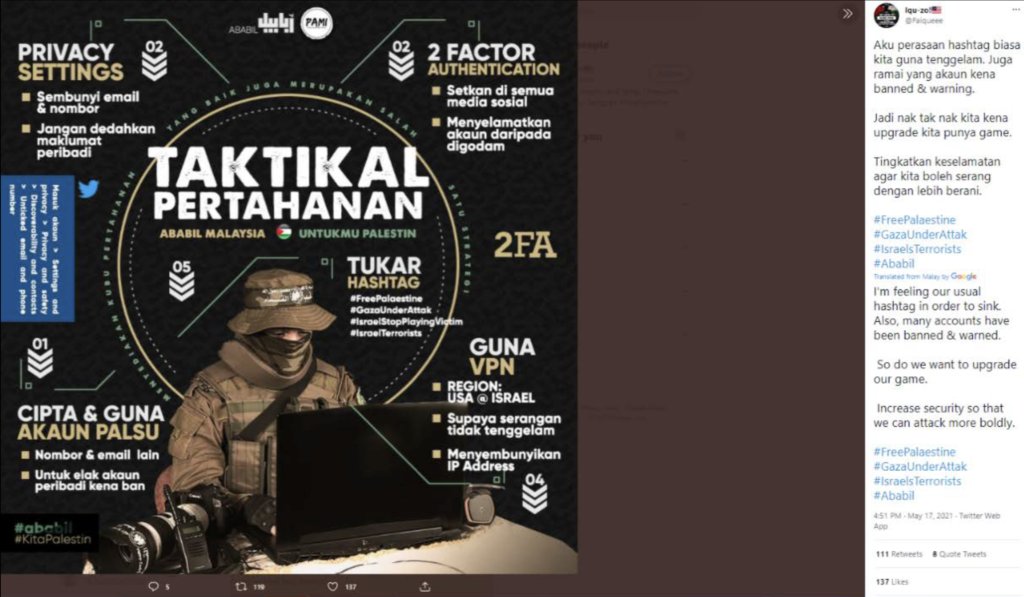Australia/Israel Review
Asia Watch: Troll play
Jul 28, 2021 | Michael Shannon

It’s a mark of our age that all conflicts – whether involving bullets and bombs, or those of a cultural or ideological dimension – have an increasingly powerful digital front. The May hostilities between Israel and Hamas in Gaza brought havoc on the ground, and an online onslaught launched half a world away in Malaysia.
A coordinated campaign by Malaysian online groups targeted Israeli public officials and citizens who were posting pro-Israel messages. The tactics employed included antisemitic and sexually explicit insults and death threats, spamming, the hacking of social media accounts, effectively getting them locked, and the dissemination of private information.
The best description of the scale and intensity of harassment came from Emily Schrader, an Israeli social media consultant and researcher, who was herself targeted. (For more on Schrader’s ordeal, see p. 15.) Writing in Tablet Magazine, Schrader recounted:
“I was targeted by Malaysians who tweeted over 100,000 times with personal insults about my appearance and dozens of poor-quality memes ranging from laughably absurd to deeply violent. Of course, I received dozens of Hitler pictures and calls to ‘kill the Jews,’ but I also had multiple fake accounts made in my name, which were tweeting and tagging people who follow my verified account, saying, ‘I’m the real Emily Schrader. I’m a slut.’”
Schrader detailed how one of the leading groups behind the cyberattacks was a Facebook group called the “Malaysian Troll Army”, which has more than half a million followers. Throughout the conflict period, the group sent out calls to harass, hack and effectively silence pro-Israel accounts.
Another group that works with the Malaysian Troll Army is the Cinta Syria Malaysia (CSM), with 300,000 followers, and its sister organisation, Cinta Gaza Malaysia, which is run by a Malaysian in Gaza, Nadir al-Nuri. Nadir himself has a Telegram network of more than 256,000 followers, which he activated during the operation by providing a list of pro-Israel accounts to hack and shut down.
Research released by the Meir Amit Intelligence and Terrorism Information Center (ITIC) in Israel further detailed how the cyberattackers identified accounts that used the most common pro-Israel hashtags in their social media content, such as #IsraelUnderFire or #IsraelUnderAttack, or expressed their support for this content. Notable targets included then-PM Binyamin Netanyahu, IDF Arab media spokesperson Avichay Adraee, Israeli Hollywood actor Gal Gadot, Christians Unite for Israel and the IDF.
A browse through the official Facebook page of the IDF during the conflict showed Malaysian accounts bombarding the comments section of every post with the same pro-Palestinian, anti-Israel/anti-Zionist statements.
The ITIC reported that one of the main hashtags that was used during the attacks was #IsraelKoyak. “Koyak” is a Malay word meaning “torn/ripped”, but it is also a slang insult commonly directed at someone who is easily frustrated or having a mental breakdown. This hashtag was mentioned more than 557,000 times on Twitter during the days of the operation in Gaza, with a potential reach of over 251 million, the report said.
While not discounting the possibility that automatic infrastructure, such as bots or pay-per-like/comment services, were also involved in the attacks, the report noted that no actual indications of this had been identified. Rather, the report observed that the network of activists “designed and spread meticulous instructions of how to attack, whom to attack and what content to use.”
Weeks after the cessation of hostilities, on July 11, Schrader released a three-minute video titled “Exposing the Malaysian Troll Army”, describing the cyberattacks as “[not] just hacktivism. It’s a digital war.”
Another unfortunate reality of our age is that the troll usually has the last word, so the response on Twitter was entirely predictable.
“Thank you for this documentary. Glad that everyone now knows what happened in Gaza and Palestine throughout that attack. They can search throughout #israelkoyak #IsraelTerrorism and #SavePalestine for more info,” said @Zhrrdin.
“This is nothing Emily. Your people attack and murdered Palestinian for real. Good Job Malaysian. Let’s make #israelkoyak,” said @Bose.
The stream of invective appears set to continue indefinitely, unless action is taken.
“There is no way social media platforms aren’t able to track and shut down these groups which are being used on social media platforms for the sole purpose of silencing pro-Israel voices,” Schrader told The Algemeiner. “The fact that this activity has gone on for months unaddressed by the networks is really a failure of enforcement of their own policies. No group should be abused this way on social media.”
Tags: Antisemitism, Israel, Malaysia, social media






